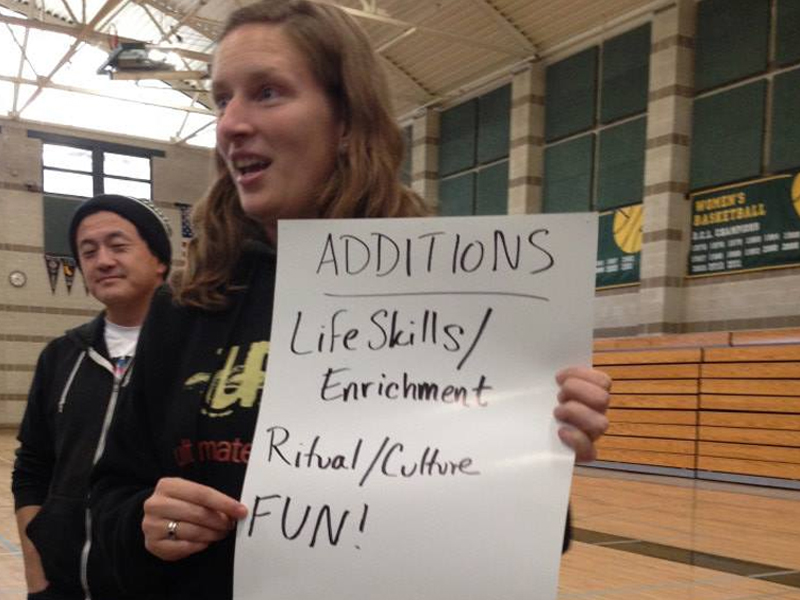
This Youth Ultimate Coaching Conference 2014 article is presented by the Bay Area Disc Association and Ultimate Peace.
“If youth coaches are serious about Spirit of the Game being important, then we must actively teach the skills required for spirited play.”
This was Miranda Roth-Knowles’ message at her YUCC presentation, “Talking the Talk, Walking the Walk: Preparing Young Athletes for Spirited Play”. 30 coaches, parents, organizers and players crammed into a middle school classroom and middle-schooler chairs to hear Miranda tell us something we all knew but probably hadn’t acknowledged.
She began by leading the group in elaborating on what “spirited play” actually entailed. “Honesty.” “Communication.” “Rules knowledge.” “Respect for others and the game”, we volunteered. She wisely added “gratitude”, “awareness” and “selflessness”. With these key words prominently written on the whiteboard, Miranda expanded on why spirit of the game is such an important component of youth ultimate.
She was preaching to the choir, but the clarity of her explanation galvanized many people’s thoughts.
“The way we live and the way we play are deeply intertwined.”
Roth-Knowles touched on the value of conflict resolution skills, communication practice, the ability of young people to stand up for themselves and the underappreciated ability to trust an opponent. Additionally, Miranda pointed out that while this would not have crossed her mind five years ago, practicing face-to-face communication with others (in a youth’s world increasingly dominated by screen-mediated communication) is a vital skill.
With solid agreement among the group that spirited play required very valuable skills for youth in general, she moved on to how we coaches might impart these skills. The message became clear: “These skills don’t necessarily teach themselves, we have to be intentional about building them in youth.”
So how to do that? The answer is very similar to how we go about building other skills. Being a positive role model. Putting the onus on kids (e.g. “this is an opportunity to show your integrity and honesty”). Focusing on specifics. Rewarding good spirit in addition to good plays. Helping experienced players be role models.
Miranda had another method: “Ask kids who they want to be: what is their individual or team image?”
This last method cemented my view that teaching spirit of the game can be just like teaching how to throw an inside out forehand. The secret is mental visualization. For forehands, we ask players to visualize the feeling of release and flight path of the disc. For on-field player interactions, we must have young players think about how they will address their opponent, what words they will use, and what they will do with the outcome. Drilling in practice leads to mastery in game!
In the last 10 minutes of the session, we split into groups to brainstorm actual on-the-field drills to help teach players the skills we’d been talking about. It is one of the great tragedies of the last few months of my life that we weren’t able to spend more time on this. Some of us were hastily able to share our brainstorms. The commonality was setting up an on-field situation where the aforementioned skills were tested (have a marker set up too close, intentionally set picks, have one team be intentionally obtuse during rules discussions ) and walk through the specifics of how to address what can be sticky situations in game time.
Miranda’s presentation got the ball rolling with how we think about coaching spirit, certainly in my mind, and definitely in the minds of all the other session attendees. Hopefully her emphasis on the topic and methods will encourage youth coaches to think about teaching spirit of the game, not with a wait-and-hope strategy, but the way we teach other skills: with a concrete, drill-based system.









Comments Policy: At Skyd, we value all legitimate contributions to the discussion of ultimate. However, please ensure your input is respectful. Hateful, slanderous, or disrespectful comments will be deleted. For grammatical, factual, and typographic errors, instead of leaving a comment, please e-mail our editors directly at editors [at] skydmagazine.com.